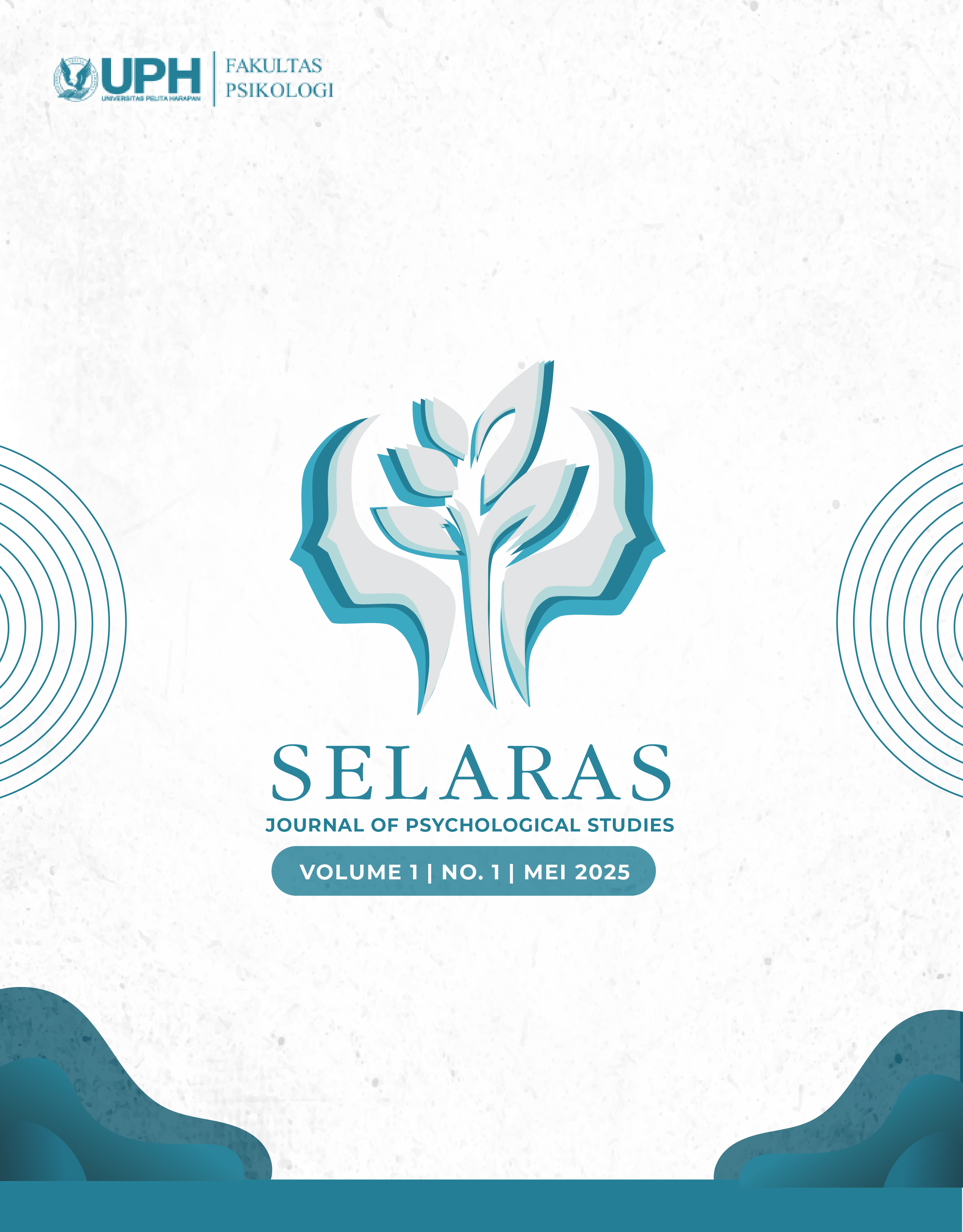MBTI Traits and Peer Likability Among Gen Z Students at Yayasan Tunas Bangsa Soposurung (YTBS) Boarding School: A Sociometric Approach
Schlagworte:
boarding school, Gen Z, communication style, MBTI, peer perceptionAbstract
This study investigated the association between the 16 MBTI personality types, the 4 MBTI groups, and peer perceptions of communication traits, specifically, being pleasant or unpleasant to talk to and being a good or bad This study investigated the association between the 16 MBTI personality types, the 4 MBTI groups, and peer perceptions of communication traits, specifically, being pleasant or unpleasant to talk to and being a good or bad listener, among high school students. A total of 320 students at a boarding school in Indonesia participated, providing 825 peer nominations. Chi-square analyses revealed moderate to strong associations between certain MBTI personality types and socially desirable traits, which varied across cohorts. Several personality types, such as Defender, Debater, and Protagonist appeared in both positive and negative peer perceptions. These findings suggest that while personality types may influence peer evaluations, Gen Z’s perceptions of conversational and listening skills depend on social norms, context, expectations, and students’ ability to adapt their behavior to different audiences. The findings imply a need for training programs to enhace student’s self-awareness, empathy, and adaptability to social contexts and expectations.
Literaturhinweise
Bartholomeu, D., Montiel, J. M., Couto, G., Bueno, C. H., Garcia, F. H. S., & Pessotto, F. (2021). Social skills and social acceptance in different educational levels: A cross sectional study. Psychology, 12(11), 1886–1899. https://doi.org/10.4236/psych.2021.1211114
Chae, M.-O. (2016). Empathic ability and communication ability according to Myers-Briggs Type Indicator (MBTI) personality type in nursing students. Journal of the Korea Academia-Industrial Cooperation Society, 17(4), 303–311. https://doi.org/10.5762/kais.2016.17.4.303
Choi, S. W., & Kim, H. S. (2020). Effects of an interpersonal relationship improvement program using MBTI on self-acceptance, self-esteem, and acceptance of others of professional soldiers. Journal of Korean Academy of Psychiatric and Mental Health Nursing, 29(1), 64–72. https://doi.org/10.12934/jkpmhn.2020.29.1.64
Clark, L. A., Zeni, C. M., Burt, S. A., Donnellan, M. B., & Neiderhiser, J. M. (2023). Personality and peer groups in adolescence: Reciprocal associations and shared genetic and environmental influences. Journal of Personality. Advance online publication. https://doi.org/10.1111/jopy.12741
De Cooman, R., & Vleugels, W. (2022). Person–environment fit: Theoretical perspectives, conceptualizations, and outcomes. In Oxford Research Encyclopedia of Business and Management. Oxford University Press. https://doi.org/10.1093/acrefore/9780190224851.013.377
Dimock, M. (2019, January 17). Defining generations: Where Millennials end and Generation Z begins. Pew Research Center. https://www.pewresearch.org/short-reads/2019/01/17/where-millennials-end-and-generation-z-begins/
Laursen, B., & Veenstra, R. (2021). Toward understanding the functions of peer influence: A summary and synthesis of recent empirical research. Journal of Research on Adolescence, 31(4), 889–907. https://doi.org/10.1111/jora.12606
Moreno, J. L. (1951). Sociometry, experimental method and the science of society: An approach to a new political orientation (Pdf ed.). The North-West Psychodrama Association / Lu Lu Press. (Original work published 1951, Beacon House, New York)
Myers, I. B., McCaulley, M. H., Quenk, N. L., & Hammer, A. L. (1998). MBTI® manual: A guide to the development and use of the Myers Briggs Type Indicator® instrument (3rd ed.). Consulting Psychologists Press.
NERIS Analytics Limited. (2022). NERIS Type Explorer® – 16 Personalities. https://www.16personalities.com
Schmitt, D. P., Long, A. E., McPhearson, A., O'Brien, K., Remmert, B., & Shah, S. H. (2016). Personality and gender differences in global perspective. International Journal of Psychology, 51(1), 45–56. https://doi.org/10.1002/ijop.12265
Siswanto, D. H., Wibowo, W. A., Saputra, Y. D., Rozaq, R. R., Suryatama, H., & Saputra, S. A. (2024). Qualitative study on the dynamics of social interaction between boarding students and the local community. International Journal of Scientific Multidisciplinary Research, 2(9), 1275–1288.
Sivrikova, N., Artemyeva, N., Sokolova, N., Moiseyeva, E., Borodina, V., & Terekhov, A. (2019). Features of the personality of the people identifying themselves with different generations. SHS Web of Conferences, 66, Article 01003. https://doi.org/10.1051/shsconf/20196601003
Slobodskaya, H. R. (2021). Personality development from early childhood through adolescence. Personality and Individual Differences, 175, 110690. https://doi.org/10.1016/j.paid.2021.110690
Szymkowiak, A., Melović, B., Dabić, M., Jeganathan, K., & Singh Kundi, G. (2021). Information technology and Gen Z: The role of teachers, the internet, and technology in the education of young people. Technology in Society, 65, Article 101565. https://doi.org/10.1016/j.techsoc.2021.101565
Ullah, A., Uddin, F., Khan, S., & Imran. (2024). Exploring the impact of MBTI personality types on teaching methods. Qlantic Journal of Social Sciences, 5(3), 309–323. https://doi.org/10.55737/qjss.559887544
Vaughans, A. (2024). Enhancing learning through MBTI: Customizing educational strategies to student personality types. In Proceedings of the 16th International Conference on Education and New Learning Technologies (EDULEARN24) (pp. 4960–4963). IATED. https://doi.org/10.21125/edulearn.2024.1215
Yu, Y., & Zhang, Y. (2021). Personality and developmental characteristics of primary school students' personality types. Frontiers in Psychology, 12, 693329. https://doi.org/10.3389/fpsyg.2021.693329
Yussoff, Y. B., Ismail, S. M., & Althabhawi, N. M. (2024). The impact of cognitive flexibility on navigating personality and learning style differences in higher education. Pakistan Journal of Life & Social Sciences, 22(2), Article 21065. https://doi.org/10.57239/PJLSS-2024-22.2.000202

